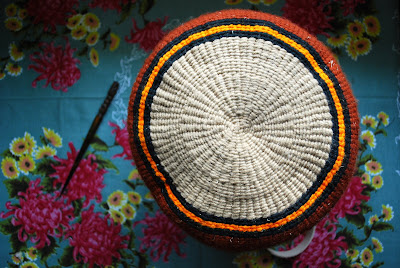shake. We did a lot of shaking, singing, dancing, crying and praising this past month! During the Pisgah team visit, the women officially opened their first bank account with Family Trust in Nakuru. Checks can now be directly deposited through the Kenya Project into their savings without depending on a team to carry cash proceeds. The most exciting news, however, is the amount of cash that opened that bank account. From the end of May, the women earned more than 200,000 shillings before expenses from the MPUMC young adult team, the Pisgah youth team, the visiting Pisgah adult team and special orders from the United States. Each member of the group took home 7,000 shillings to support her family to honor her tireless work since the beginning of June: every day of the week, often Saturdays too. Over 70,000 shillings was set aside as savings. To put that into perspective for those of you who do not speak Kenyan currency, one term of school fees at Mountain Park totals 2,000 and the average monthly salary of our teaching staff is no more than 5,000. Furthermore, the ladies will receive their first official distribution of money earned in the United States through a check deposit to Family Trust on the 15th of this month!
The ladies were also movers and shakers in the lessons of business this month. Due to the volume of orders, time management was crucial. They experimented outsourcing the leather work to additional tanners in order to ease the load of Joseph and to turn their inventory quicker. After some disappointing showings by other gentlemen, to the point of the ladies having to unstitch the leather to salvage their weaving, Joseph emerged the clear winner…and he earned a bonus. Due to a hiccup in planning and the need to fulfill an order before a certain baby arrived, Ann joined me in town this past weekend to explore distribution options. We learned the hard way. Shipping anything reliably, no matter how small or lightweight, to the United States is not cheap. We also discussed introducing a small flat rate shipping fee to all orders regardless of how they are delivered to account for the work required of Gideon and Liz once the goods arrive home.
rattle. Check out the new products! I stopped by the women’s headquarters on the dining hall stage one day this week in between audit madness to find that Mary had woven a formed baby rattle. I was flabbergasted, picked one up, gave it a little jingle and started to dance! The rattles (or maracas for those more musically inclined) are woven in the same manner as the briefcase bags and baskets—yarn knotted over sisal—with extra special attention paid to finishing the handle for baby’s safety. The women selected a combination of bottle caps and small stones for the noisemaking. Let me know if you are interested!

Also, though the next product has nothing to do with rattles, isn’t the newest handbag we’ve added to the GWW line stunning?!? We are proud to introduce the “recycled plastic” line after searching far and wide for the inputs. These bags or baskets are crocheted with recycled plastic “yarn,” just as you would crochet with traditional materials for blankets, sweaters, etc. Each piece is unique due to the variation in the colors of the plastic, hence the blue hue of this lovely one. Some pieces turn out more solidly silver, white, or with a green tint. An unbending metal handle finishes the look. Shoulder straps are available on other styles, including on a round basket, messenger style bag, or tote bag. Prices vary from $20 to $35 depending on size. We’re taking orders for this ecologically conscious product now—a product quite fitting for the Kenyan attitude that very little of our garbage is actually trash.
 roll.
roll. We are rolling forward this month with our sales planning and product development. The ladies business savvy is continuing to expand. Shortly after the Pisgah team departed, we held a session on jewelry design and finding the “highest and best use” for their supply of unique beads. Last week, without my prompting, they invited an instructor to hold a class on how to install the hardware handles on the recycled plastic crocheted bags and baskets. They had formerly outsourced this part of production. Although we had originally expected July to be a slow month for business, the women were invited to show their goods at the end of the month to a Salt Lake-based team visiting Nakuru with Kenya Partners, the muscle behind Methodist Secondary across the road. Lastly, Reuben is researching investment options for the group’s cash capital. We are hoping to find a strong, relatively liquid outlet for their growing cash pot by the end of the year with future plans to look at purchasing a plot of land in 2010.
As always, the women extend their sincerest thanks to friends and members of The Kenya Project for the generous supply donations and for supporting their work through recent purchases! The women are always open for business and up for a challenge. If you have a special request, let us know.
Please continue to follow the women’s progress here. We will begin posting a special feature of each group member soon so that you everyone can get to know each of the Wonderful Women, even from a distance!
Until next time...
tnick















